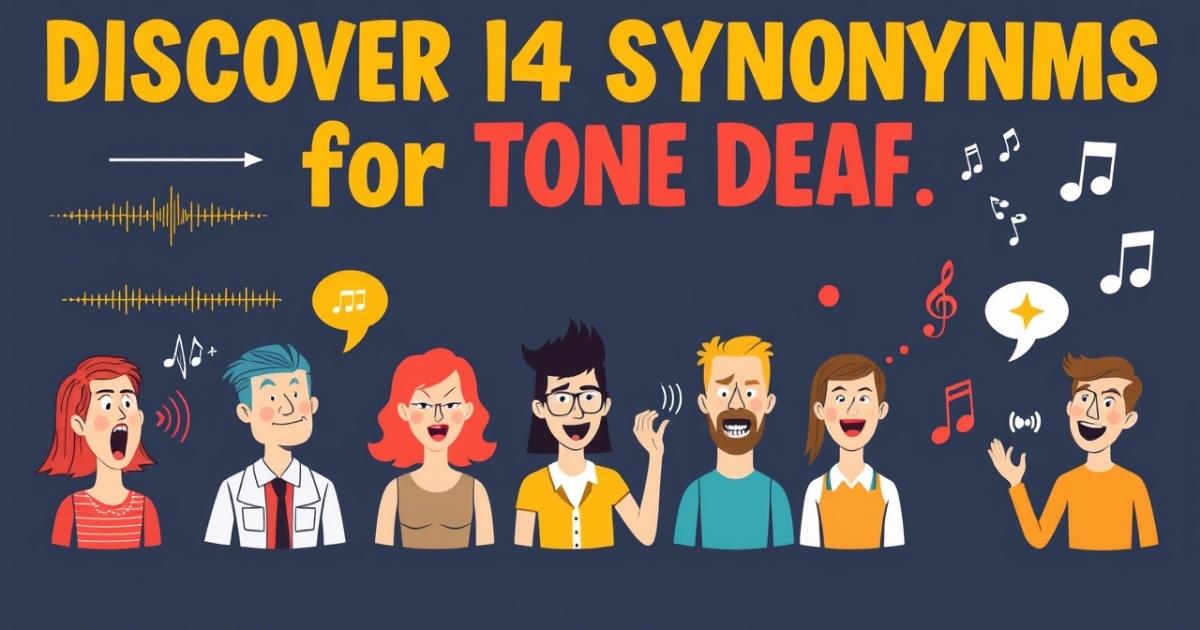Understanding the synonyms for tone-deaf can help you speak more clearly and kindly. Sometimes, people say things that seem cold or off. They might not mean to, but it happens. Using a tone-deaf synonym can describe this behavior better. Words like insensitive, clueless, or unaware are good choices. If you’re looking for another word for tone deaf, there are many. These words help explain when someone lacks emotional or social awareness.
Knowing the right synonym for tone deaf helps in both talking and writing. It makes your message more thoughtful. You might also want to know the opposite of tone deaf, like empathetic or understanding. Using the correct tone-deaf synonym builds better communication. When you use the right words, people feel heard. Learning these synonyms for tone-deaf is a step toward respectful and mindful conversations.
Main Points
- Improve your communication skills with better word choices.
- Avoid common social mistakes by understanding these alternatives.
- Enhance emotional awareness in your interactions.
- Strengthen relationships with more thoughtful language.
- Develop better listening skills and improve understanding.
Insensitive

People use the word insensitive as one of the common synonyms for tone-deaf. It describes someone who doesn’t notice others’ feelings. When someone is insensitive, they may hurt others with their words. They don’t always understand how their actions affect people.
Insensitive people may speak without thinking. They ignore signs that someone is upset. This can lead to hurt feelings or misunderstandings. Emotional intelligence helps prevent this. With practice, people can learn to be more aware and thoughtful.
Being less insensitive means listening more. Watch how others react to your words. Pay attention to non-verbal cues. Try using empathy in every conversation. Kindness and awareness help build better relationships. People feel safe when others show understanding and care.
Rude
Rude behavior also falls under synonyms for tone-deaf. It means being impolite or blunt. A rude person may speak harshly or interrupt others. They often ignore basic manners. This behavior can damage trust and make communication harder for everyone involved.
People sometimes act rude without meaning to. It might be stress or lack of awareness. Still, the result is the same—others feel disrespected. Workplace communication suffers when rudeness is common. Teams don’t connect well when someone’s tone is off.
Fixing rude behavior starts with self-awareness. Think before you speak. Be mindful of your tone and words. Respectful dialogue helps build trust. Small acts of politeness go a long way. Even a calm tone and a smile make a difference.
Inconsiderate
Inconsiderate is another word under synonyms for tone-deaf. It describes someone who doesn’t think about others’ needs. Their actions seem selfish or careless. In group settings, this behavior causes frustration. People may feel ignored, especially during important conversations or decisions.
Being inconsiderate can show up in small ways. Talking loudly during meetings. Ignoring personal space. Forgetting to say thank you. These actions add up. Over time, others feel dismissed. It affects team dynamics and trust. People want to feel respected and heard.
You can avoid being inconsiderate by thinking of others first. Ask how people feel. Offer help when needed. Practice active listening. Respect boundaries. When we show consideration, we build positive relationships. A little thoughtfulness makes work and life better for everyone.
Unperceptive
Unperceptive is one of the stronger synonyms for tone-deaf. It means someone who misses emotional cues. They don’t notice when others are hurt or uncomfortable. This can lead to awkward or painful moments. Unperceptive people may not realize the impact of their words.
When someone is unperceptive, they often talk over others. They miss signals like silence, frowns, or tone changes. In conversations, they might seem off. This makes others feel ignored. Social awareness helps avoid this problem and improves connection.
To become more perceptive, slow down. Watch people’s faces and body language. Ask gentle questions to check how they feel. Build emotional intelligence through practice. This helps avoid miscommunication and awkward moments. Perceptive people make others feel safe and respected.
Related Guide:
Discover 11 Other Ways to Say “We Request Your Presence”
Clueless
Clueless is a casual word used in many synonyms for tone-deaf discussions. It means lacking awareness in social situations. A clueless person might say the wrong thing at the worst time. They often don’t notice how others react or feel.
Being clueless doesn’t mean someone is mean. It usually means they haven’t learned certain social skills. They might miss hints or emotional signs. Others may think they’re inconsiderate. It’s frustrating when someone never picks up on obvious feelings or situations.
Improving from clueless to aware takes effort. Listen closely. Don’t rush to respond. Notice people’s expressions and reactions. Ask yourself how your words might feel to others. Social skills grow with time, patience, and care. Empathy helps build trust and connection.
Unaware
The word unaware is often used as one of the synonyms for tone-deaf. It describes people who don’t realize what’s happening around them, especially emotionally. They might not know their words hurt someone. This lack of awareness causes confusion or even conflict.
Unaware people usually mean well. But they miss emotional details others easily catch. They may interrupt, overlook discomfort, or speak without tact. This can lead to misunderstandings. Without self-awareness, relationships suffer. Others may feel like their feelings don’t matter.
To stop being unaware, stay present. Practice mindful communication. Pay attention to others’ tone and reactions. Ask for feedback often. Build social awareness through honest reflection. Over time, you’ll learn how to notice emotional moments. That awareness builds stronger, kinder relationships.
Oblivious
Oblivious is often listed among common synonyms for deaf. It means someone completely unaware of others’ feelings or social cues. They might keep talking while someone’s clearly upset. This unawareness can feel cold, even if it’s not intentional. It affects trust quickly.
An oblivious person usually doesn’t notice emotional tension. They may miss sarcasm, discomfort, or body language. This makes their responses seem out of place. People around them might get frustrated or feel unheard. Strong communication depends on social awareness and emotional presence.
To avoid being oblivious, observe more. Slow your speech. Look for facial expressions and body signals. If someone seems upset, pause and check in. Reflect on conversations afterward. Awareness takes time to build, but it’s worth it. It helps deepen connection.
Indiscreet
Indiscreet is one of the sharper synonyms deaf. It refers to someone who speaks or acts without thinking about privacy or timing. Sharing too much or saying the wrong thing at the wrong time shows a lack of discretion and awareness.
Indiscreet behavior often hurts others or creates embarrassment. Someone might reveal a secret, joke insensitively, or comment loudly about private matters. These slip-ups break trust. In group settings, indiscretion damages rapport and causes discomfort. Respectful dialogue depends on thoughtful word choice.
To avoid being indiscreet, think before speaking. Ask yourself if your words could harm or embarrass. Practice tact in sensitive moments. Consider tone and timing carefully. Social intelligence means knowing when to speak and when to hold back. That builds respect.
Unsympathetic
Unsympathetic is a strong term among synonyms for tone-deaf. It describes someone who shows no concern for others’ feelings. When someone shares pain, an unsympathetic response feels cold. Lack of empathy makes people seem distant and emotionally closed off, even if unintended.
An unsympathetic person might respond with “get over it” or offer no comfort at all. This reaction shuts down emotional connection. In relationships and teamwork, it creates walls. People want understanding, not judgment. Thoughtfulness builds bridges, while unsympathy causes distance.
To become more sympathetic, listen fully. Show you care through words and tone. Even a simple “I understand” can mean a lot. Use compassion in daily conversations. Emotional intelligence is key to deeper human bonds. Care and connection always matter.
Inattentive
Inattentive is often grouped with common tone-deaf. It describes someone who doesn’t focus on what others are saying or feeling. They miss important emotional signals. This can make conversations feel one-sided or hollow, weakening personal and professional relationships over time.
An inattentive person may interrupt, drift off, or ignore key details. Their mind wanders during important talks. This leads to misunderstandings and hurt feelings. In the workplace, it harms teamwork and productivity. At home, it creates distance and frustration between loved ones.
To improve attentiveness, stay present. Make eye contact. Nod or respond naturally to show you’re listening. Avoid distractions like phones. Ask questions that show you care. Attentiveness builds trust, strengthens conversations, and helps others feel truly heard and respected.
Unthoughtful

Unthoughtful is one of those synonyms for tone-deaf that points to careless behavior. It means acting without thinking how words or actions affect others. Unthoughtful people often speak too quickly, joke at the wrong time, or ignore emotional signals without meaning harm.
Being unthoughtful might seem minor, but it adds up. It makes people feel unimportant or unseen. When someone always forgets what matters to you, it hurts. In teams, it weakens morale. In friendships, it builds resentment over time. Thoughtfulness matters.
To become more thoughtful, pause before speaking. Ask yourself, “How will this make them feel?” Consider timing and tone. A little care goes a long way. You don’t need perfect words just intention and empathy. That’s what leaves a lasting impression.
Uncaring
Uncaring is one of the coldest tone-deaf. It means showing no concern for someone’s emotions or well-being. An uncaring person may seem distant or harsh, even when others are clearly upset. This can shut down connection and deepen emotional wounds.
Uncaring behavior doesn’t always come from cruelty. Sometimes it’s stress, distraction, or emotional burnout. Still, the effect is real. People feel rejected, lonely, or undervalued. Whether in families or teams, showing care is essential. Without it, people start pulling away silently.
To show you care, acknowledge feelings. Offer comfort with words or actions. Listen without fixing everything. Even small gestures like asking how someone is show heart. Compassion is the foundation of strong relationships. Being caring isn’t weakness it’s strength rooted in understanding.
Impolite
Impolite is one of the most common synonyms for tone-deaf in social settings. It means lacking manners or courtesy. An impolite person may interrupt, use rude language, or ignore polite norms. This behavior can seem disrespectful, even when there’s no bad intent.
When someone is impolite, it affects how others feel around them. It can create tension, especially in workplaces or group environments. Small acts like not saying “thank you” or failing to greet someone can leave a negative impression that lingers much longer than expected.
To avoid being impolite, practice simple gestures of respect. Say “please” and “thank you.” Don’t interrupt. Be mindful of tone and body language. Basic courtesy builds mutual respect. It’s not just about rulesit’s about treating others with kindness and consideration.
Inept

Inept is one of the lesser-used synonyms for deaf, but still powerful. It describes someone who lacks skill, especially in social or emotional areas. An inept person might speak at the wrong time or handle emotional situations poorly, often unintentionally.
Being inept doesn’t mean being unkind it means being unskilled in response. You might say the wrong thing at a serious moment or miss emotional cues. These mistakes make people feel misunderstood or overlooked, even if the intention was never to hurt.
Improving social skill takes effort. Watch others who handle situations well. Learn from their tone, words, and body language. Ask for feedback when needed. Growth happens slowly, but with self-awareness, anyone can become more emotionally intelligent and socially aware over time.
FAQ’s
Why is it important to understand synonyms for tone-deaf?
Understanding synonyms for deaf helps us communicate better. It reminds us to be more aware of others’ feelings and avoid emotional missteps in conversations.
What is the opposite of being tone-deaf?
The opposite of synonyms for tone-deafis being emotionally intelligent, empathetic, and considerate. People who show emotional awareness are more likely to respond thoughtfully to others’ needs.
Can being tone-deaf affect relationships?
Yes, synonyms for tone-deaf harm relationships. When we fail to notice emotional cues, we can unintentionally hurt others, creating distance or misunderstandings.
How can I avoid being tone-deaf in conversations?
To avoid synonyms for tone-deaf actively, pay attention to body language, and practice empathy. These actions help you understand others better and improve your communication.
Can tone-deaf behavior be changed?
Yes, synonyms for tone-deaf can be improved with practice. Becoming more aware of others’ feelings, listening carefully, and practicing empathy.
Conclusion
understanding synonyms for tone deaf can greatly improve communication and relationships. Words like insensitive, rude, inconsiderate, and clueless are all tone-deaf synonyms that describe individuals who lack awareness of others’ emotions. Recognizing these traits can help us avoid misunderstandings and communicate more effectively.
By being mindful of these synonyms for tone deaf, we can learn to respond with more empathy and consideration.
Instead of being synonyms for tone deaf we can aim for emotional intelligence and awareness. The opposite of tone deaf synonym is being empathetic and sensitive to others’ needs. Whether it’s in the workplace or personal life, improving our social awareness can strengthen relationships and prevent hurt feelings. Ultimately, using these insights will help you build better connections and become a more considerate communicator.

Ember Rose is a dedicated administrator with 4 years of experience in efficient operations management and team leadership. Skilled in streamlining workflows and enhancing productivity.

